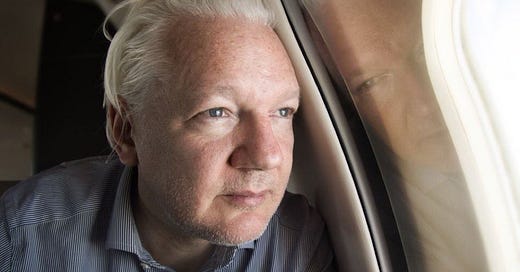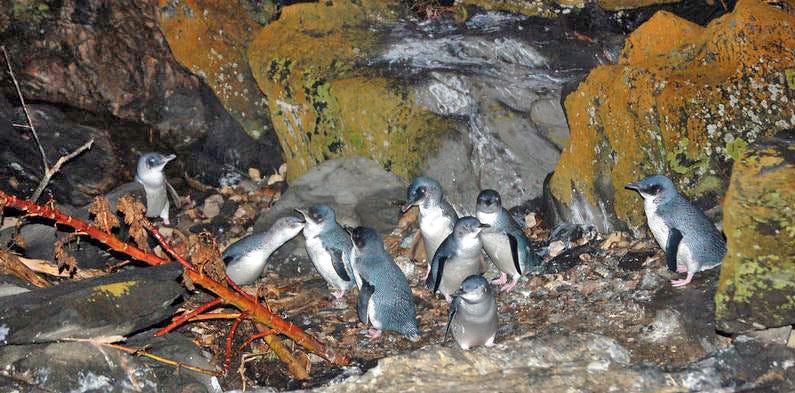Notes from Down Under: Julian Assange, Tucker Carlson and little penguins
What happens when you ‘embarrass’ the US?
Happy Friday - you’re reading Notes from Down Under, a weekly newsletter taking a glance at some of the key stories in Australia from the perspective of a British journalist.
Julian Assange: convicted felon and free man
It’s been a 14-year-saga in which politicians, human rights activists and the media have argued over the rights and wrongs of Julian Assange who fought against extradition to the US where he was accused of disclosing military secrets.
This week, the WikiLeaks founder is a free man after pleading guilty to one charge of espionage.
On Wednesday, after leaving Belmarsh prison in the UK, Assange entered the formal plea in the Northern Mariana Islands, an American territory in the Pacific.
He was sentenced to time already served and released to fly to his native Australia where he was reunited with his family on Thursday.
When he was in charge of Wikileaks in 2010, Assange published confidential or restricted official reports related to US military secrets - as well as releasing a video from a US military helicopter which showed civilians being killed in Baghdad.
Over 14 years, Assange took refuge in the Ecuadorian Embassy in London, faced orders for extradition to the US and served time at Belmarsh prison.
His release involved negotiations across Australia, the US, Sweden, the UK and Ecuador. (A useful timeline can be found here)
What happens when you “embarrass” the US?
Following Assange’s release, Australian media has used the events of the last week to reflect on American-Australian relations.
Dr Emma Shortis is The Australia Institute's international and security affairs senior researcher and she had this to say on the release of Assange:
“The US-Australia alliance is consistently described as being based on shared democratic values. To have that message then sitting alongside the pursuit of an Australian publisher for the publication of information that embarrassed the United States, really became irreconcilable and I think exposed some of the hypocrisy of that relationship and of the United States in particular.”
As usual, Crikey.’s politics editor Bernard Keane made the point emphatically:
“There is now an established precedent for journalists, editors and publishers, even those outside the United States, to be prosecuted if they embarrass the US government by revealing classified information… And even if Assange had rejected the deal and stayed to fight on in the UK and won his appeal, much of that damage would still be done.”
So, nearly a decade and a half after Assange leaked secret state information, his case has instilled in the media a fear of what can and cannot be shared in the interest of the public.
An (interesting) tangent…
Back in February, I booked Tariq Ali for Times Radio following the death of Russian opposition leader and political prisoner Alexei Navalny.
Ali - a political activist, journalist and supporter of Assange - said: “Julian Assange is the West's Alexei Navalny."
While both figures did embarrass world powers with their actions, they did so in very different ways.
Writing for the think tank Foreign Policy in Focus researcher and socialist Mira Oklobdzija notes: “Navalny fought for the freedom of his country, Assange for the transparency, freedom of information and press.”
And, of course, they were taking a stand in very different “political realities” - aka Vladimir Putin’s Russia versus the Western justice system.
Oklobdzija also added: “There is a clear and striking difference in the response of world leaders concerning these two dissenters”.
David Cameron, Joe Biden, Emmanuel Macron and Olaf Scholz were among the world leaders condemning Putin's regime after Navalny’s death.
While, in Assange’s case, Oklobdzija highlighted that the “most vocal dissenters are Reporters Without Borders, the International Federation of Journalists, DiEM25, Amnesty International, [and] Human Rights Watch”.
But, interestingly, one of the governments that did support the WikiLeaks founder was Australia which called for the US to end its pursuit of Assange.
Greg Barns, a barrister and legal adviser to the Australian Assange campaign, told the BBC it was politics that made a difference.
"The [Anthony] Albanese government was the first to elevate the matter with the US. And Albanese got support from the Opposition…The treatment [of Assange] stuck in the craw of many Australians. People would ask, 'Where’s the public interest in that?'"
Tucker Carlson comes to Australia
Political conferences are an odd part of any speaker circuit.
I’m not talking about the party-politics ones but the “thought leadership” conventions where recognisable speakers come out with exaggerated rhetoric that sounds almost farcical (whether you agree with their views or not).
For example, in February, former UK Prime Minister Liz Truss told the Conservative Political Action Conference (CPAC) that the US and UK need a "bigger bazooka" to fight the left.
And, at the National Conservatism Conference’s opening dinner in 2023, author Douglas Murray said: “I see no reason why every other country in the world should be prevented from feeling pride in itself because the Germans mucked up twice in a century.”
This week, a similar event has been taking place across Australia.
The Australian Freedom Conference is hosted by Tucker Carlson, an American political commentator and former Fox News host who consistently drew about three million viewers each evening.
He’s worked with businessman and Australian politician Clive Palmer who The Australia Institute says uses “controversial legal strategies [that] challenge Australia’s trade agreements and environmental laws, and have profound implications for global climate action”.
The pair’s conference is described as an event covering a “range of topics, including current and future threats to truth, democracy and personal freedoms in a world that is becoming unrecognisable to the one we once knew”.
Unfortunately for them, their conference has not had the strongest start:
Before it even began, ticket prices were quietly slashed from $200-$290 to as low as $50 in Sydney. Adelaide, Melbourne and Perth’s cheapest tickets went down to $110.
As the conference began in Perth on Monday, Palmer was ill with laryngitis and so unable to address the estimated 2,500 people.
Then, the Brisbane show was interrupted by activist Drew Pavlou waving a Ukrainian flag.
Discussion at the Canberra event was overshadowed by the news of Julian Assange’s departure from the UK.
And worst of all when it comes to any event’s PR - photos emerged of empty seats in at least one event.
Animal story of the week:
The little penguin population on Kangaroo Island is in decline, according to the first island-wide survey in over a decade.
The Kangaroo Island Landscape Board (KILB) revealed that the island had an estimated 1,348 little penguins in 2011 but is now thought to have only 558.
The biggest decline in numbers occurred between 2011 and 2013 when only 566 birds were counted - and this was the last time an island-wide survey was conducted.
But there is a “beacon of hope”, according to KILB. The Emu Bay colony has shown a “remarkable” 36 per cent increase compared to the 2011-2013 averages.
A view from here:
With winter in full swing, Melbourne’s Queen Victoria Market hosts a night market every Wednesday so the whisky bloke and I decided to go along (and hang out in the photo booth).
Thanks for reading - please subscribe and share, it helps get the word out there.
Until next week!







